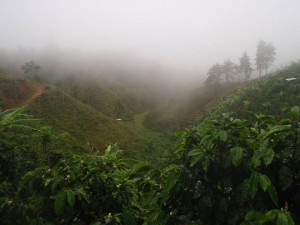Global Plant Health Internship
We live in a global community and plant diseases do not recognize country borders. Agricultural trade is responsible for movement of a myriad of plant pathogens globally each year. A significant portion of the foods we consume are grown in the tropics and imported into the United States. Students need a global perspective on the plant pathogens that infect our imported food crops.
The International Research Experience for Students (IRES) in Global Plant Health promotes discovery research using hands-on training in the tropics. Plant disease is a limiting factor in agricultural production in many areas of the world. In the humid tropics, diseases are difficult to control due to high rainfall conditions and the presence of a diversity of plant pathogenic microorganisms.
The program was directed by Dr. Jean Ristaino (Department of Plant Pathology) and Dr. Margo Daub (Department of Plant Biology). The pprogram ran from 2010-2012 and is no longer being taught.
Requirements for the Global Plant Health Internship program include:
- 1 semester studying tropical plant pathology (PP540), offered in the spring
- 6-week summer research internship in Costa Rica
- 1 special problems research course, offered in the fall.
- Upper-undergraduate or graduate level
Learning objectives of the program include:
- Developing a knowledge base and critical thinking skills on issues related to tropical agriculture, emerging plant diseases, ecology and the environment.
- Identifying trade issues that are important in regulating plant pathogens that are imported from the tropics.
- Identifying and developing appropriate skills for conducting ecologically-based plant pathology research in the tropics.
- Developing an appreciation for the language, culture and people of Costa Rica and the foods they consume and export.
Click here to hear about Bridget Lassiter, a former participant, and her Global Plant Health Internship experience! Check out these CALS perspective articles for additional info on the program:
- Interns learn valuable life lessons while studying tropical plant pathology in Costa Rica
- Tropical Crops
Join Global Plant Health on Facebook!
2013 Global Plant Health Interns (pictured left to right): Jeremy Nelson (Development of a species specific PCR assay for Hemilia vastatrix, causal agent of coffee rust), Nicole Lewis (PCR detection of downy mildew of cucurbits), Meghan Wyatt (Population genetics of the causative agent of black sigatoka,Mycosphaerella fijiensis), Ravi Dixit (Isolation of a new fungal pathogen of Jatropha curcas), Kristin Vickers (Mechanical inoculation of impatiens necrotic spot virus in tomato and cucumbers and confirmation through ELISA), and Anthony Wenndt (Assessment in vitro activity of Trichoderma spp as biocontrol against Ojo de Gallo (Mycena citriciola) in coffee).
To learn about their research projects, click on the student’s name.
2012 Global Plant Health Interns (pictured left to right): Angelina Song (Tissue culture of Tagetes filifolia plants), Katie Schneburg (Mycena citricolor on Costa Rican Coffee Plants), Billie Espejo (Melodogyne hapla affects carrot plantations in Cartago Costa Rica), Elizabeth Garvey (Characterization of races of Panama Disease of Bananas (Fusarium oxysporum f. sp. cubense) in Costa Rica), Lauren Maynard (characterization of water relations of six common bean cultivars) , Mary Lewis (Isolation and Genetic Study of Black Sigatoka Mycosphaerella fijiensis on Musa spp), Taylor Metcalf (Races of Pseudoperonospora cubensis on Cucurbits).
To hear more about their research projects, click on the student’s name.
2011 Global Plant Health Interns (pictured left to right): Caleb Pearce (Identification of Phytophthora species on cacao), Laura Bostic (Isolation of Black Sigatoka Mycosphaerella fijiensis on Musa spp:), Jessica Pope (Isolation of Black Sigatoka Mycosphaerella fijiensis on Musa spp:), Alyssa Koehler (Characterization of Phytophthora species and other fungi on pineapple), Robin Singh (Genotyping of Phytophthora infestans in Costa Rica)
To learn more about their research projects, click on the student’s name.
Global Plant Health Intern Posters featured at the NC State Undergraduate Research Symposium:
- Vickers, K., Hanley-Bowdoin, L., Montero, M., and Barboza-Vargas, N. 2013. Isolation and detection of Impatiens necrotic ringspot virus in tomato and cucumber. NC State Undergraduate Research Symposium. July 31, 2013, C34.
- Wyatt, Meghan, Ristaino, J. and Gomez-Alpizar, L. 2013. Population Genetics of Mycosphaerella fijiensis Morelet, the causative agent of Black Sigatoka. NC State Undergraduate Research Symposium. July 31, 2013, A20.
- Nelson, J., Blanco, M. and Daub, M. 2013. Molecular Analysis of Coffee Rust pathogen Hemileia vastatrix. NC State Undergraduate Research Symposium. July 31, 2013, B42.
- Dixit, Ravi. And Shew, B. 2013. The Identification of the fungal pathogen Colletotrichum on the leaves of Jatropha curcas. NC State Undergraduate Research Symposium. July 31, 2013, D 33.
- Katie Schneberg and Ristaino, J. 2012. CSI Dublin: Hunt for the Potato Killer. NC State Undergraduate Research Symposium. Aug. 1, 2012, A16.
- Wyatt, Meghan, Saville, A. and Ristaino, J. 2012. Genetic structure of modern U.S. genotypes of Phytophtora infestans. NC State Undergraduate Research Symposium, Aug. 1, 2012, C5.
- Singh, R. Gomez-Alpizar, L. and Ristaino, J. 2011. Genotyping of Phytophthora infestans in Costa Rica. Undergraduate Research Symposium. August 3, 2011, D10.




